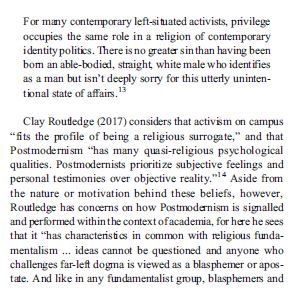
Why Some Social Scientists (& Natural Scientists Who Dabble in Social Sci) Who Embrace Empiricism, Skepticism, Falsification, & Ruling Out Alternative Explanations in Their Scholarship Jettison All That For Social Justice
Thread
1/n
Thread
1/n
DISCLAIMER: This thread is NOT about social scientists who prioritize activism/social justice/"disrupting" whatever they want to disrupt over truth. I write about that all the time (screenshots shown). This thread is NOT about those people. 







This thread is about the others, such as:
1. Professors of Medicine denouncing papers reviewing evidence showing affirmative action is ineffective.
1. Professors of Medicine denouncing papers reviewing evidence showing affirmative action is ineffective.
such as:
2. Science reformers, who do excellent work on, say, statistics or transparency, who accuse their opponents of stuff right out of the Critical PoMo playbook:
punching down" or "bropen science" or accuse those who question claims made by BIPOC scientists of racism/sexism
2. Science reformers, who do excellent work on, say, statistics or transparency, who accuse their opponents of stuff right out of the Critical PoMo playbook:
punching down" or "bropen science" or accuse those who question claims made by BIPOC scientists of racism/sexism
You cannot say "these people reject science, logic and evidence," because, in their day jobs, they embrace them and, in the case of the science reformers, are earnestly trying to improve those practices.
So THAT is the puzzle that has troubled me for about 3 years now:
"Why is it that, among people who engage in fullthroated embrace of empiricism, logic, skepticism, and falsification in their (admittedly academic) day jobs completely jettison all that in real life so very often?"
"Why is it that, among people who engage in fullthroated embrace of empiricism, logic, skepticism, and falsification in their (admittedly academic) day jobs completely jettison all that in real life so very often?"
Part of the answer is probably some form of modularity. Thinking about "improving mediational modeling" (which mostly means better tests for ruling out alternative explanations) is in its own little world, completely separate from social justice issues.
Its a good parallel, because "ruling out alternatives to discrimination for inequality/gaps" is almost always a key question if you care about either truth or redressing injustice. Is job inequality mostly a result of hiring discrim or differences in education or family?
But, as you all know, one of the quickest ways for an academic to be denounced and mobbed is to question ANY explanation other than "discrimination in the present" (White supremacy, systemic racism, implicit bias, microaggresisons, etc.) for inequality.
Why? I suspect that this article by @alan_davison has an answer. BTW, altho it does not explicitly address what I am about say here, it is a terrific read, highly readable, and I highly recommend it.
link.springer.com/content/pdf/10…
link.springer.com/content/pdf/10…

Here are some of its key points. Davison refers to a cluster of perspectives as "PostModern Critical Theories," PMCT. He first points out that people who believe these theories will crash and burn from their own incoherence and unhingedness from reality are likely wrong. 

"Why" you ask, in a pleading tone of exasperation, "can't we assume such bad ideas will die of their own manifest toxicity?" Davison's answer is long and rich, you should read it. He starts w/a fundamental idea from biocultural evolution: Inaccurate beliefs can have advantages. 

But why PMCT in particular? Well, its not PMCT in particular. It is probably many other totalizing conspiracy-type beliefs. I'd speculate Qanon & New World Order conspiracies, for some, would also fit. But returning to PMCT, why is it so *culturally effective*? Davison: 

Now let's return to my original question:
https://twitter.com/PsychRabble/status/1418934490383142921
My speculative hypothesis is in two parts:
1. Modularity. Just because someone is scientific *over here* does not mean they realize they can and should apply the same principles *over there.*
1. Modularity. Just because someone is scientific *over here* does not mean they realize they can and should apply the same principles *over there.*
Concretely: Someone who thinks clearly about ruling out alternative explanations in experiments or tests of mediation simply does not apply that same critical eye when evaluating things in the real world, including those related to inequalities and injustice
2. The Relgio-Parasitic Memetic Qualities of PostModern Critical Theories. They "feel" right, especially to progressives who are highly motivated to redress injustices. Feelings generally precede and often drive analytic thought. 

This then turns off their critical thinking capacities. No matter how well-developed those capacities are in OTHER areas of their work, they are, in a completely modular manner, unhinged (so to speak) from their evaluations of social justice.
END
END
https://twitter.com/PsychRabble/status/1418769296398946307
• • •
Missing some Tweet in this thread? You can try to
force a refresh












